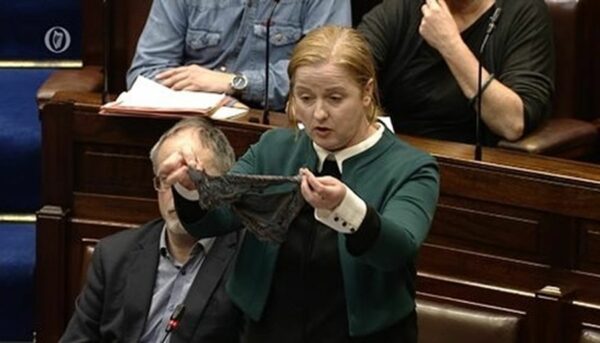Global opposition to victim blaming in Irish rape trial
Socialist Party (CWI in Ireland) reporter
“Does the evidence out-rule the possibility that she was attracted to the defendant and was open to meeting someone and being with someone? You have to look at the way she was dressed. She was wearing a thong with a lace front.”
These comments from defence barrister Elizabeth O’Connell in a Cork rape trial have sparked outrage throughout the island of Ireland and internationally. Made about a 17-year-old woman, and without any objection from the judge, the remarks were a clear example of victim-blaming and rape myths being used in open court. This is in a state where the majority of rapes and sexual assault are unreported, and only 10% of reports end in a conviction.

Protests across Ireland
Under the hashtag #ThisIsNotConsent, women have been posting photos of their underwear. Angry protests have now taken place in cities across Ireland at very short notice and during work hours. In Cork, 500 marched to the courthouse where the comments were made, many leaving underwear on the steps and railings of the building. 500 also protested in central Dublin, 250 in Belfast, 50 in Limerick and 40 in Galway. Most of these protests were called on the initiative of ROSA – the Socialist Feminist Movement, of which the Socialist Party is a central part.
This explosion of anger reflects the fact that, increasingly, women and young people are not willing to accept victim-blaming and misogyny in society. In March/April this year, thousands took to the streets after the acquittals of Ulster rugby players in a rape trial in Belfast where similar victim-blaming tactics were used. Huge numbers got active in the referendum campaign to achieve repeal and abortion rights.
Two weeks ago, Google workers in Dublin walked out of work as part of a global action against sexual harassment. The latter example shows the potential for workers to get organised in their workplaces against such manifestations of sexism, an issue that the trade union movement must take up in a serious way.
Thong in the Dáil
Solidarity TD and Socialist Party member Ruth Coppinger reflected the mood when she questioned Leo Varadkar in the Dáil, demanding action from the government on victim-blaming in the courts and holding up a thong in the chamber. This is probably a first in Dáil history, and cameras quickly panned away from the “offending item”. However, as Ruth pointed out, if this is incongruous in the national parliament, it’s even more so for underwear to be used in a court as evidence against a woman.
Ruth’s bold intervention has garnered huge attention from the national media, along with the protests that have taken place. Significantly, it has also gotten coverage in media outlets in countries as diverse as New Zealand, Australia, India, Turkey, Canada, the US (including the New York Times, Newsweek and CNN) and in many countries across Europe.
International Women’s Day walkouts
There is potential for a new movement around the issue of victim-blaming and gender-based violence. ROSA are calling for mass protests and walkouts on International Women’s Day 2019, drawing inspiration from the Spanish example, where a ‘feminist strike’ brought millions out of work and onto the streets this year.
This movement must absolutely demand and fight for changes such as compulsory training for judges and juries in cases of sexual violence and education about consent in schools. However, the case in Cork is not an isolated example. Victim-blaming and misogyny are endemic in the court system, the state and in society generally under a capitalist system which has sexism and inequality at its core. We need to build a movement of women, young and LGBTQ people and all sections of the working class around an anti-capitalist and socialist-feminist programme which challenges this system and all the injustices it perpetuates.



